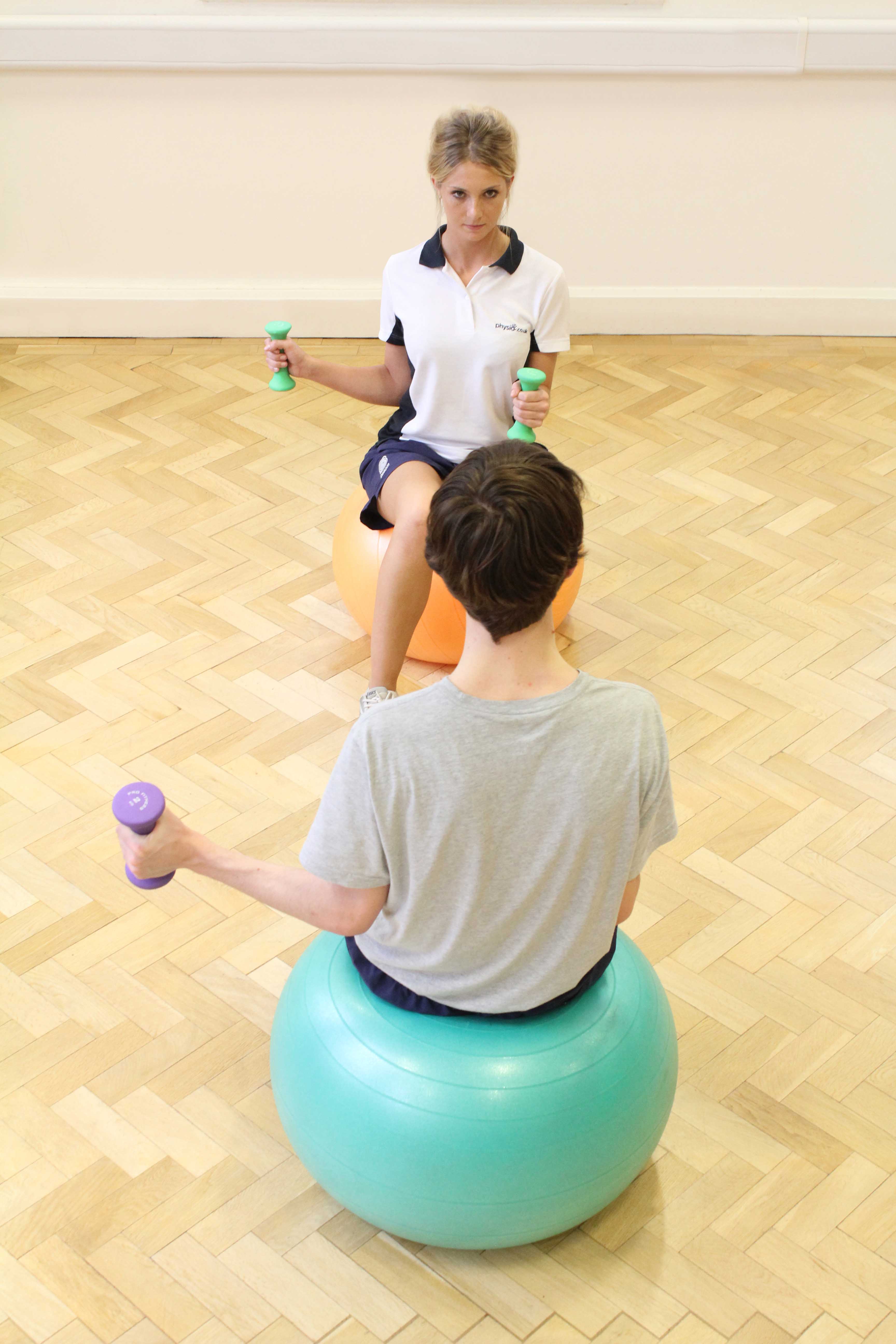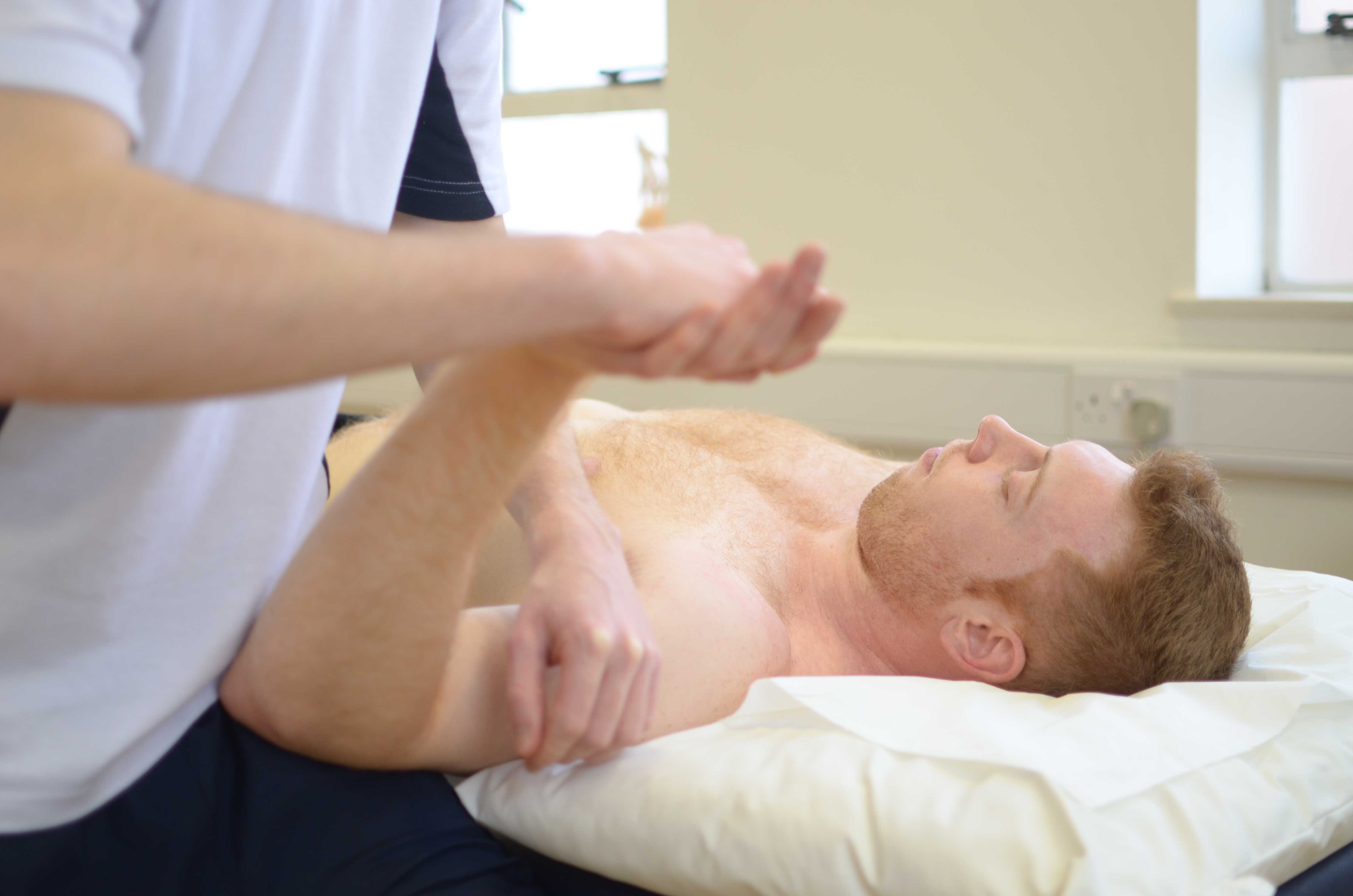Arthroscopy of the Shoulder
Shoulder arthroscopy is a minimally invasive shoulder operation used to investigate, diagnose and treat a variety of shoulder problems ultimately to improve function. Arthroscopy is also known as key-hole surgery.During the procedure 2 or 3 small cuts are needed in order to pass through an optical camera (arthroscope) and any tools or equipment the surgeon needs. The arthroscope provides a clear and easy picture of the inside of your shoulder allowing the surgeon to see if everything is normal or if any structures are damaged. There are 2 types of shoulder arthroscopy performed. These are:
- Diagnostic Arthroscopy – investigative procedure to find out if there is anything wrong with your shoulder
- Therapeutic Shoulder – correction of any injury or defect within your shoulder.
 Above: Soft tissue massage of the trapezius muscle by MSK Physiotherapist
Above: Soft tissue massage of the trapezius muscle by MSK PhysiotherapistShoulder arthroscopy is performed on a variety of conditions and patients. They are routinely carried out on patients suffering from arthritic changes, such as rheumatoid arthritis and osteoarthritis, and on traumatic injuries. Common procedures undertook through arthroscopy include:
- Debridement
- Tendon repairs
- Rotator cuff repairs
- Impingement syndrome
- Shoulder instability
- Frozen shoulder
- AC (Acromio-clavicular ) arthritis
 Above: Shoulder assessment conducted by a therapist
Above: Shoulder assessment conducted by a therapistPhysiotherapy prior to Shoulder Arthroscopy
Before you undergo surgery Physio.co.uk will develop a rehabilitation programme to help with acute symptoms, improve muscular strength, restore normal biomechanics and provide a platform for post surgical rehab. These exercises will prepare your shoulder for surgery and improve your rehab time frame. Exercises will be aimed towards scapular stabilising and scapular strength. Treatment will include:
- Cryotherapy
- Pain management
- Taping
- Scapular stabilising exercises
- Scapular strength exercises
- Shoulder strengthening
- Advice and post surgical management
Symptoms following Shoulder Arthroscopy
Following surgery it is normal for you to experience symptoms as a result of the anaesthesia and operation performed. You will normally be placed in a sling to help protect the shoulder. During this time you surgeon will instruct you on the amount of movement you are allowed and what you can and cannot do. The symptoms produced will be more excessive depending on how invasive and the specific procedure performed. Common symptoms include:
- Pain
- Swelling
- Bruising
- Numbness (usually self resolving after the anaesthesia wears off)
- Stiffness
Physiotherapy following Shoulder Arthroscopy
Following your arthroscopy Physio.co.uk will compile a thorough assessment of your shoulder and develop a personal rehabilitation programme to suit you individual needs. This programme will focus on managing acute symptoms following surgery, decreasing pain, improving mobility, increasing strength and optimising functional use of your arm. Your programme will be specific to the procedure you undergo with your treatment programme reflective of your specific needs and personal requirements.Treatment may include:
- Pain management
- Scar management
- Advice and education
- Postural education
- Active and passive range of movement exercises
- Joint mobilisations
- Shoulder strengthening exercises
- Scapular stabilising exercises
- Rotator cuff strengthening exercises
- Stretches
- Soft tissue release
- Proprioceptive exercises
- Functional activities
- Sports specific exercises
Summary
Shoulder arthroscopy is a minimally invasive surgery performed to help examine, diagnose and treat traumatic or insidious shoulder problems. It can be performed by itself or in conjunction with a form of repair or reconstruction. Physiotherapy is an essential component of rehabilitation to help reduce pain and restore movement. Physio.co.uk will provide a comprehensive and specific treatment programme to ensure the full recovery of movement, strength and functional use of your arm. Call Physio.co.uk now on 0330 088 7800 for more information or to book an appointment please contact us.

 0330 088 7800
0330 088 7800


































